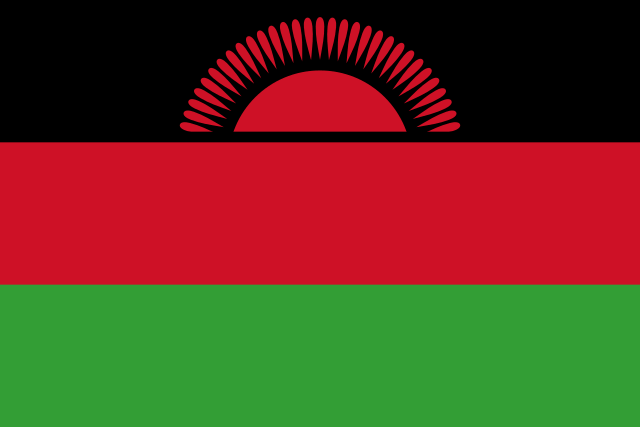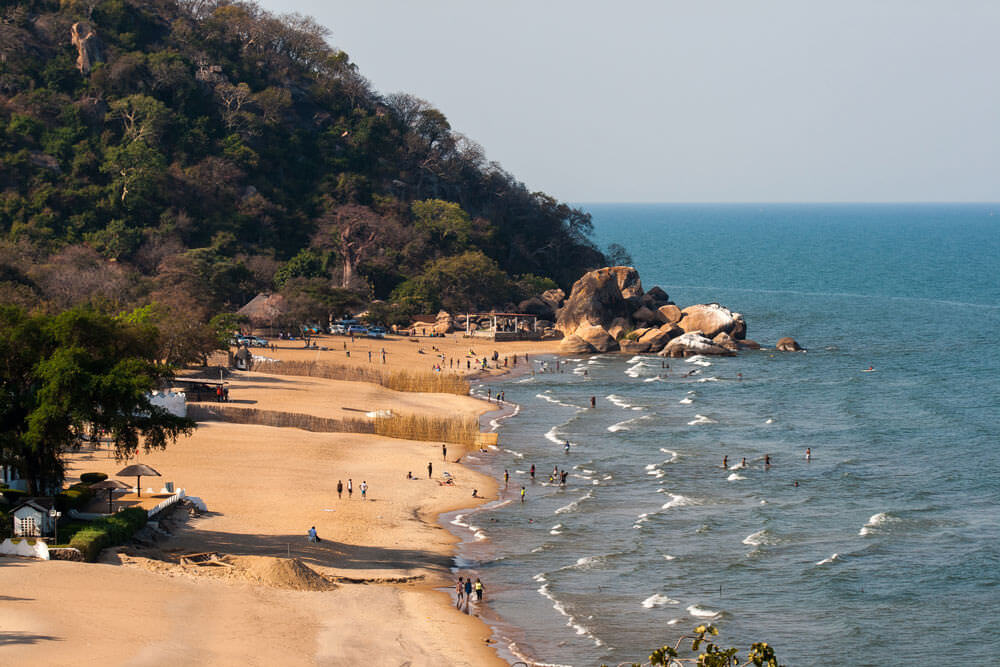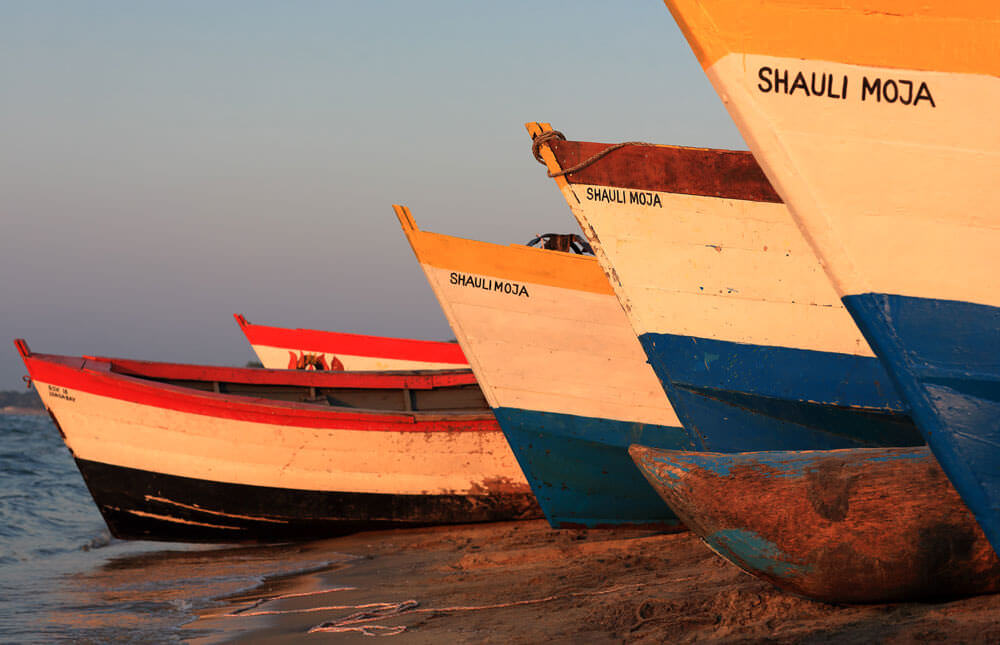Malawi

Capital City: Lilongwe
Population: 19,610,000 (2022)
Land Area: 118,760 sqkm
Official Languages: English
Time Zone: GMT+2hr
Currency: Malawi kwacha (MWK)
GDP: 12.6 billion USD (2021 est.)
Main industries: Agriculture
Principal exports: Tobacco, grains, pearls, sugar, coffee and tea
Malawi is a landlocked country in southeast Africa that shares its northern border with Tanzania and its western border with Zambia, while Mozambique surrounds the southeastern half of the country. Malawi has a land area of 118,760 sqkm. It features Lake Nyasa, which covers approximately one-fifth of the country’s area, with woodland and mountains covering the land area. Due to the highly varied landscape, temperature and rainfall differ within the country.
Lake Malawi is home to a wide range of aqua species. Lake Malawi National Park, located in the southern part of the lake, is recognised as a UNESCO World Heritage for its biodiversity. Malawi has four basic regions; the East African Rift Valley is a trough-like shore that includes Lake Malawi and numerous swamps and lagoons. The second type of landscape is the central plateaus take up the majority of the land area along the western lakeshore of Lake Malawi. The third region, the highland, which rises up to 2,400 metres above sea level, is scattered around the country. The fourth physical region consists of the Mulanje Massif. Malawi has two major drainage systems, one being Lake Malawi which joins the Zambezi River in Mozambique via the Shire River and the other being Lake Chilwa.

Demographic
The total population of Malawi is 20,308,502 as of 2022. Various ethnicities reside in Malawi – the Chewa constituting the largest group (34.3%) and constitute the vast majority of the urban population, followed by the Lomwe (19%), Yao (13.2%), Ngoni (10.4%), Tumbuka (9.2%), Sena (3.8%), Mang’anja (3.2%), and Tonga (1.8%), Nyanja (1.8%) and Nkhonde (1.0%). Foreigners make up the rest of the population.
The official language of Malawi is English, but Chewa is the lingua franca of the majority. Other languages spoken include Lambya, Lomwe, Ngoni, Nkhonde, Nyakyusa, Nyanja, Sena, Tonga, Tumbuka, and Yao. Christianity is the religion of the majority (77.3%), while Muslims constitute a significant portion (14%) too. Among the Christians, most of them are independent Christians, whilst about one-fifth practice Roman Catholicism and another one-fifth practice Central African Presbyterianism. Currently, Malawi is urbanizing rapidly to cater an 82% of the population living in rural areas. Malawi has a notably young demographic, as two-thirds of the population aged under 25.
History
Human cultural artifacts dating back over 50,000 years were found in Malawi. The San people of southern Africa have affinities to the early Homo sapiens residing in Malawi. From the 1st to the 4th centuries, Bantu groups invaded the region and had resided there since. Ironworking and cultivation spread as the Bantu settlement did. Between the 13th to 15th centuries, another wave of Bantu-speaking people arrived from the north and assimilated the earlier inhabitants. They created centralized systems of government and proclaimed the Maravi Confederacy in 1480. Agriculture flourished in the 18th and 19th centuries. In the 19th century, Swahili-speaking groups migrated to the Malawi region as traders or refugees, who became the dominant ruling class of their spheres of influence.
In 1891, the Nyasaland Districts Protectorate was established as a British colony. Infrastructures, such as roads and railways, were built under colonial rule. Despite strong opposition from the Nyasaland African Congress and white liberal activists, Britain combined Nyasaland with the Federation of Northern and Southern Rhodesia (now Zambia and Zimbabwe respectively) on 23 October 1953. African nationalism gained momentum in the 1950s and became evident in 1958 under Hastings Kamuzu Banda’s leadership. In 1961, legislative elections were held, and Banda’s party won overwhelmingly. Eventually, Malawi proclaimed independence on 6 July 1964.
After settling internal disputes, on 6 July 1966, Malawi became a one-party republic, and Banda was elected president. Malawi Congress Party (MCP) was the ruling party led by Banda. Malawi prospered economically with major achievements in the production of cash cropa such as tobacco, tea, and sugar. Transport and communication systems were also improved. In 1975, Lilongwe replaced Zomba as the capital of Malawi. In 1980, despite the general sentiment among black majority-ruled countries to cut diplomatic ties with the apartheid regime of South Africa, Banda maintained good relations with South Africa for economic reasons.
In 1992, Malawi suffered a severe drought which sparked widespread protests in Malawi. Opposing parties, including the United Democratic Front (UDF) led by Bakili Muluzi, emerged. A referendum was held the following year to determine the need for reform, choosing between one-party rule and democracy. An overwhelming majority voted for democracy. Thus, in May 1994, free elections were held, and Muluzi became the new president.
A new democratic constitution was promulgated in 1995. It provided greater freedom of speech, assembly, and association to the people. Attempts were made to reduce poverty and food shortages. Muluzi also pursued good relations with Arab countries and a more active role in regional politics. Bingu wa Mutharika, Muluzi’s successor, implemented a hard-line approach to eliminate corruption and arrested prominent party officials. This act attracted foreign aid to improve the country’s educational system and healthcare infrastructures. In 2005, Mutharika left UDF to form a new party, the Democratic Progressive Party (DPP). In 2011, influenced by the Arab Spring, nationwide protests occurred. Unexpectedly, Mutharika died of a sudden heart attack in 2012. Joyce Banda, the head of the People’s Party (PP), became the acting president two days later. She restored diplomatic relations with Britain and normalized relations with aid donors. She also focused on repairing the economy and eliminating corruption. Her economic policies were effective – Malawi’s economic growth rate doubled in her first two years of office.
Key Dates
1480 – Maravi Confederacy established
1891 – Britain establishes the Nyasaland Districts Protectorate
1953 – Britain combines Nyasaland with the Federation of Northern and Southern Rhodesia
1964 -Malawi proclaims independence on 6 July
1966 – Malawi becomes a republic under one-party rule; Banda elected first president
1975 – Lilongwe replaces Zomba as the capital of Malawi
1992 – Reformists wins the national referendum
1994 – Muluzi elected president and succeeds Banda
1995 – Democratic constitution officially promulgated

Legal System and Government
Malawi is a multiparty republic wherein a president serves as the head of state and the government and cannot serve more than two five-year terms. The president and the vice president(s) are elected by universal suffrage, whereas the president appoints the cabinet. The unicameral legislature, the National Assembly, is directly elected via universal suffrage and members serve five-year terms.
The legal system of Malawi is based on English common law coupled with statutory laws, customary laws, and religious laws. Malawi’s judiciary is not located in Lilongwe, the capital, but instead in the city of Blantyre. The judiciary consists of the Supreme Court of Appeal, the highest court in Malawi, the High Court, and other subordinate courts. The Traditional Courts no longer exist in parallel with the above high court system, but its jurisdiction over customary law and minor cases remain recognised by the 1994 Constitution.
Economy
Malawi has huge potential for development with an undiversified economy dependent on the agricultural sector. Over 80% of the population lives in rural areas and primarily relies on subsistence agriculture. Half of the population lives under the poverty line. Foreign aid from the IMF and the United States has contributed substantial sums to the growth of the country’s economy. In 2020, the net official development assistance (ODA) received by Malawi consists of 12.1% of its gross national income (GNI).
Agricultural farming forms the backbone of Malawi’s economy, accounting for about one-third of the GDP and more than 80% of export earnings. This sector employs roughly 65% of those in formal employment, directly or indirectly supporting an estimated 85% of the population. Agriculture flourished due to the availability of large arable land. Commercial enterprises and smallholders alike have been successful in cultivating a range of crops, including tobacco, which accounts for more than half of the country’s exports.
Economic growth has recovered from COVID-19 from 0.9% in 2020 to 2.8% in 2021. The growth rate of 2022 is projected to decelerate to 2.1% due to dry spells in the growing season and tropical storms that damaged farmland and infrastructure. The recent exchange rate adjustments and international price increases contributed to the 24.6% inflation in 2022. The government is committed to consolidating official reserves and overturning the fiscal deficit of 2021/22. The Malawi Growth and Development Strategy (MGDS) III is the third five-year plan to build a productive, competitive and resilient nation, focusing on education, energy, agriculture, health, and tourism. The government envisions Malawi transforming into a wealthy, self-reliant, industrialised upper middle-income country by 2063.
Trade
Malawi’s GDP in 2021 was US$12.6 billion approximately. Over 60% of Malawi’s GDP is derived from international trade. The exports, which amounted to almost US$1.05 billion, were mainly tobacco (50.4%), oil seeds and miscellaneous grains (8.8%), pearls and precious stones (8.2%), sugar (6.7%), and coffee and tea (6.7%). Top export destinations were Belgium (20.8%), South Africa (6.2%), United Kingdom (6.0%), Kenya (5.1%), and the United States (4.6%). Imports, totalling US$1.7 billion, included electrical machinery and equipment (11.1%), mechanical appliances (9.1%), pharmaceutical products (8.5%), vehicles (7.4%) and plastics (5.8%). Petroleum had been a major imported product until the recent shortage. Top import suppliers were South Africa (20.6%), China (16.2%), the United Arab Emirates (10.1%), India (7.7%), and the United Kingdom (4.6%).
Malawi is part of the South African Development Community (SADC) and the Common Market for Eastern and Southern Africa (COMESA) and has bilateral trade agreements with China, South Africa, Zimbabwe, Mozambique, and Botswana.
Investment Opportunities
Malawi executes its plan to become an inclusively wealthy and self-reliant nation by 2063 through the MGDS. There are three main pillars, namely agriculture productivity and commercialisation, industrialisation, and urbanisation. While diversifying the agricultural sector, Malawi seeks to improve irrigation infrastructure and adopt technologies to minimise the impact of adverse weather. Transport and information communication technologies, as well as energy generation, are top development priorities. The government promotes financing of flagship projects through Public-Private Partnership (PPP) arrangements to encourage private sector investments in infrastructures. In 2022, the government continued to ramp up its investment expenditure in these flagship projects in the priority areas.
Tourism is another important focus, as Malawi has a diverse and scenic landscape perfect for ecotourism. Malawi, having earned the name “Warm Heart of Africa”, strives to promote itself as a tourism destination. The government plans to urbanise all tourist attraction sites as a priority, creating huge employment opportunities.